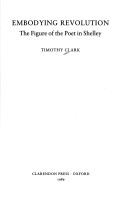Oxford English Monographs
1 total work
This is a study of Shelley's work, approached in terms of a forgotten aesthetic, prominent and controversial in the 1800s, who connected introspection and radical politics. It focuses on the recurring figure of the solitary poet in Shelley's work, hounded by passion or madness; an image which contrasts strongly with the commonly held view of Shelley's work in terms of sensibility and indulgence of feeling. The study sees this figure as an allegory of a violent revolutionary age. Shelley's self-analyses and metaphysical speculations are related to a notion of the poet as an explorer of the uncharted regions of the mind, yet far from being a visionary or distanced persona, he is an ambivalent fictional embodiment of the social forces tearing Europe apart in the Romantic Age.
